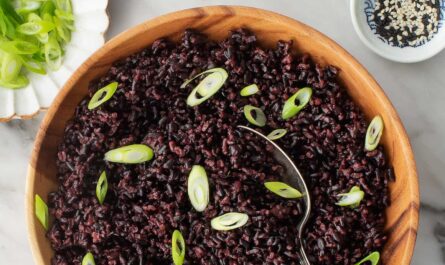In recent years, the popularity of black rice has surged among health enthusiasts and culinary experts. Known for its deep purplish-black hue, this unique grain is not only captivating to the eyes but also boasts a wealth of nutritional benefits. One of the most discussed attributes of black rice is its antioxidant levels. In this article, we will explore how black rice stands in comparison to other grains and what makes its antioxidant content noteworthy.
For those who enjoy sushi, incorporating black rice into your diet can offer more than just an exotic twist to your favorite dishes. With its high antioxidant levels, black rice could be a healthier alternative to traditional sushi rice. Let’s dive deeper to understand the intricacies of these antioxidants.

Understanding Antioxidants
Antioxidants are molecules that inhibit the oxidation of other molecules. Oxidation is a chemical reaction that can produce free radicals, leading to chain reactions that may damage cells. Antioxidants such as vitamins C and E, selenium, and carotenoids, are known to neutralize free radicals in our bodies, thereby reducing oxidative stress and preventing damage to our cells.
Why Antioxidants are Important
Antioxidants play a crucial role in maintaining health by protecting the body from damage caused by harmful molecules known as free radicals. This protection is essential in reducing the risk of chronic diseases like heart disease, diabetes, and cancer. Additionally, antioxidants are known to support immune function and skin health, slow down the aging process, and improve overall well-being.
Black Rice: The Forbidden Rice
Black rice, often referred to as ‘forbidden rice’ due to its exclusive consumption by ancient Chinese royalty, is a whole grain that has been gaining attention for its impressive nutritional profile. It is rich in fiber, protein, and a host of essential minerals. However, its standout feature is its high antioxidant levels.
The Nutritional Profile of Black Rice
Black rice contains a range of nutrients that contribute to its health benefits. These include:
- Protein: Essential for muscle repair and growth.
- Fiber: Aids in digestion and helps maintain healthy cholesterol levels.
- Iron: Crucial for transporting oxygen in the blood.
- Vitamin E: An antioxidant that helps protect cells from damage.
For more detailed information on the nutritional benefits of black rice, check out this [link](https://www.webmd.com/diet/health-benefits-black-rice) here.
Antioxidant Levels in Black Rice
The primary antioxidants found in black rice are anthocyanins, which give the rice its distinctive dark color. These powerful antioxidants are also found in blueberries, blackberries, and cranberries and are known for their ability to reduce inflammation and improve heart health.
Comparative Antioxidant Levels
When comparing the antioxidant levels of black rice to other grains, black rice stands out significantly. Studies have shown that black rice contains higher levels of anthocyanins than blueberries and other colored grains. This makes black rice not only a colorful addition to your meals but also a potent source of health-promoting antioxidants.
Health Benefits of Black Rice
Incorporating black rice into your diet can offer a range of health benefits, thanks to its high antioxidant levels. These benefits include:
Anti-Inflammatory Properties
Anthocyanins in black rice have been shown to reduce inflammation, which is a key factor in many chronic diseases. By reducing inflammation, black rice may help lower the risk of heart disease, diabetes, and even certain cancers.
Improved Heart Health
Black rice’s high antioxidant content has been linked to improved heart health by reducing oxidative stress and inflammation, both of which are risk factors for heart disease.
Enhanced Cognitive Function
The antioxidants in black rice are also believed to support brain health by protecting neurons from oxidative damage and reducing the risk of neurodegenerative diseases.
Incorporating Black Rice Into Your Diet
Adding black rice to your diet can be both delicious and rewarding. It can be used in a variety of dishes, from salads and stir-fries to desserts and sushi. For sushi lovers, black rice can provide an exciting twist to traditional sushi rolls, adding both color and a boost in nutrition.
For more tips on how to incorporate black rice into your meals, consider visiting this [link](https://sushiandrice.com/black-rice-and-digestion/) here.
Conclusion
In conclusion, the antioxidant levels in black rice are remarkable, making it a valuable addition to a healthy diet. Its high levels of anthocyanins not only provide health benefits but also add a vibrant color to your meals. Whether you’re a sushi lover or simply looking to enhance your diet with nutrient-rich foods, black rice is an excellent choice.

FAQs
1. Is black rice healthier than brown rice?
Black rice and brown rice both offer unique health benefits. Black rice is higher in antioxidants, while brown rice provides more fiber. Including both in your diet can offer a comprehensive range of nutrients.
2. Can black rice help with weight loss?
Black rice is high in fiber and protein, which can help you feel fuller for longer, potentially aiding in weight loss when included as part of a balanced diet.
3. How should I store black rice?
Black rice should be stored in an airtight container in a cool, dry place. For extended shelf life, it can also be stored in the refrigerator.
For more information on black rice and its health benefits, visit this [link](https://www.metropolisindia.com/blog/preventive-healthcare/the-hidden-benefits-of-black-rice-health-advantages) here.
This article contains affiliate links. We may earn a commission at no extra cost to you.



